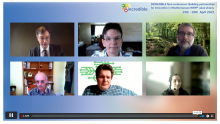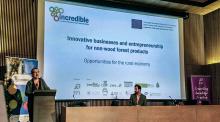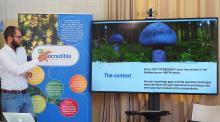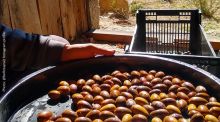Global experts call for action to leverage the potential of non-wood forest products for Europe's green economy
At the time when the stronger development of the bioeconomy will help the European Union accelerate progress towards a circular and low-carbon economy, global experts on non-wood forest products (NWFP) are calling on European and international institutions, governments, policy makers and private sector to recognise and leverage the potential of those products and consider them as a key element of the green economy in Europe and worldwide.
“The forests are our most important terrestrial natural capital but to unlock the forest potential we need to stop looking at our forest with the old paradigm lenses, with fossil economy lenses. As a compensation for a broken economic system, we need to start using circular bioeconomy lenses and then we will see that forests are not only our most important carbon seam or the main host for biodiversity. They are also an amazing source for healthy food, biomedicine, and biological resources such as wood, corks, resins that with emerging technologies can be transformed in a total new range of bio-based solutions. So, they play a crucial role to decarbonize our economy.” Marc Palahì, Director of the European Forest Institute (EFI).
Indeed, the non-wood forest products are a central element of sustainable development and sustainable forest management. They contribute to the United Nations Sustainable Development Goals (SDGs)[1] in the social and cultural, environmental, and economic dimensions; and notably to rural development, nature conservation, human well-being, and in line with the European Green Deal[2] – to a greener and more sustainable post-COVID economic restart.
The legally declared international trade of NWFPs is in the range of €8.7 billion per year, and in this respect, Europe is a key player. The European Union (EU) accounts for almost half of the imports (€4.2 billion) and 40% of exports (€3.4 billion), though domestic productions are not reflected in these international trade statistics[3].
Despite all the opportunities that the NWFP offer, they face significant challenges such as the lack of systematic knowledge, regulation and management, the climate change is already affecting them, the uncontrolled or unsustainable harvesting of wild products, the illegal trade that is a driver of unsustainable practices, the change of land use, among others, as the experts point out.
“There is a need to advance towards a common vision in the domain of NWFP and take urgent action to address those challenges.” Inazio Martinez, Head of the European Forest Institute Mediterranean facility (EFIMED).
This call for action arise from the “Manifesto of Alghero” drawn up jointly by the participants of the Policy Forum “Untapping the potential of non-wood forest products for Europe's green economy”, which was organised on 16 and 17 March 2021 by the INCREDIBLE Consortium and the European Forest Institute (EFI) in cooperation with the Food and Agriculture Organization of the United Nations (FAO).
The “Manifesto of Alghero: A commitment to promote the contribution of non-wood forest products to inclusive and green growth and eco-social progress in Europe and worldwide” puts forward the multifunctionality of the forests, proposes some key relevance benefits of NWFPs, different implemented strategies, key issues to consider, weaknesses and threats related to NWFPs, and call for actions proposed by stakeholders. “The Manifesto underlines the strong commitment of stakeholders to promote the sustainable consumption and production of NWFP. It provides a useful framework to strengthen cooperation among key players on priority areas that need to be addressed to unlock the full potential of NWFP in Europe and other parts of the world as effective contribution to the SDGs”, stated Sven Walter, Senior Forestry Officer, FAO, who facilitated the preparation of the Manifesto during the Forum.
Additionally, this Policy Forum served as an opportunity to consider the salient policies and enrich the white paper on policy priorities for non-wood forest products in Europe, also elaborated under the INCREDIBLE project.
In this sense, experts have selected and pointed out key policy actions needed to secure successful NWFP value chains in the frame of this White Paper, which are a) securing their conservation and sustainable supply; b) building competitive, equitable and sustainable value chains; c) improving transparency, data and information flow; d) and enabling conditions by ensuring coherence of institutional action, fostering sustainable investments and improving financial support and fostering innovation, knowledge transfer capacity building and sharing of good practices.
“Europe has now the EU Green Deal, but EU Green Deal will not succeed unless it engages with those managing our most important green infrastructure in Europe, which is our forest. And there is a gap in that sense. So, in my opinion, there will not be EU Green Deal without a new deal for European forest.”, Marc Palahì, Director of the European Forest Institute (EFI).
To close this gap, experts encouraged the European Commission to promote coordinated regional, national and subnational programmes through the integration of NWFPs in the European Green Deal and the European Forest Strategy, and its Action Plans. But also, improving labelling and standards for the sustainable consumption and production of and trade in wild products, for example under the Farm to Fork Strategy.
This call for action addressed also national and regional authorities to promote collaboration and partnerships with the private sector, adopt innovative, effective and clear fiscal and labour regimes and implement and promote traceability and certification systems adapted to wild food. Without forgetting, the important role of the United Nation’s System, international organisations and academia in supporting countries and stakeholders.

About
The INCREDIBLE project aims to show how Non-Wood Forest Products (NWFP) can play an important role in supporting sustainable forest management and rural development, by creating networks to share and exchange knowledge and expertise. ‘Innovation Networks of Cork, Resins and Edibles in the Mediterranean basin’ (INCREDIBLE) promotes cross-sectoral collaboration and innovation to highlight the value and potential of NWFPs in the region.
Funding
 ‘Innovation Networks of Cork, Resins and Edibles in the Mediterranean basin’ (INCREDIBLE) project receives funding from the European Commission’s Horizon 2020 programme under grant agreement Nº 774632
‘Innovation Networks of Cork, Resins and Edibles in the Mediterranean basin’ (INCREDIBLE) project receives funding from the European Commission’s Horizon 2020 programme under grant agreement Nº 774632
Contact
Email: info@incredibleforest.net or use the contact form.
We welcome your feedback!















Comments (10)
Add Comment